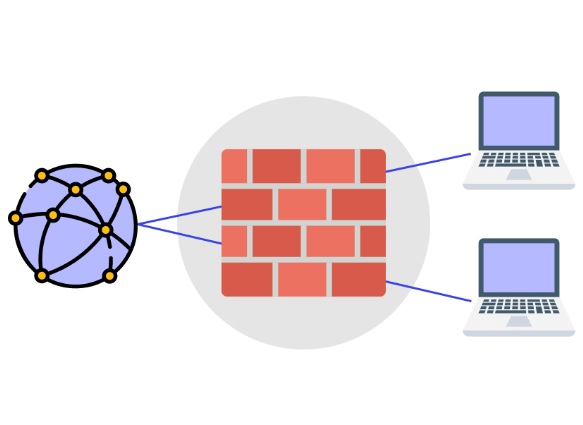
As more businesses and individuals conduct their activities online, the need for robust network security has never been more urgent. Cybercriminals are always on the prowl, looking for vulnerabilities to exploit and data to steal. One effective way of protecting your network from cyber attacks is by using firewall.
In this article, we will explore the different types of firewall available, how they work, and why they are essential in today’s digital landscape.
In recent years, we have witnessed an increase in cyber attacks and data breaches, which have resulted in significant losses of money, reputation, and customer trust. Hackers are always coming up with new and sophisticated ways of compromising networks, and it is up to businesses and individuals to take proactive measures to secure their networks. One such measure is the use of firewalls.
What are Firewalls?

A firewall is a network security device that monitors and filters incoming and outgoing network traffic based on a set of predetermined security rules. The primary function of a firewall is to block unauthorised access to a network while allowing legitimate traffic to pass through. Firewall can be hardware or software-based and are designed to protect networks from external threats such as viruses, malware, and hackers.
Types of Firewalls
There are different types of firewall available, each with its strengths and weaknesses. These include:
Packet-Filtering Firewall
Packet-filtering firewalls are the most basic type of firewall and are typically the first line of defence in a network. They operate at the network layer of the OSI model and filter packets based on their source and destination IP addresses, port numbers, and protocol types. Packet-filtering firewalls are fast and efficient but offer limited protection against sophisticated attacks.
Stateful Inspection Firewall
Stateful inspection firewall operate at the transport layer of the OSI model and keep track of the state of network connections. They are more advanced than packet-filtering firewall and can monitor the entire network session, including the contents of the packets. Stateful inspection firewall offer better protection against attacks such as Denial of Service (DoS) and Distributed Denial of Service (DDoS) attacks.
Proxy Firewall
Proxy firewall operate at the application layer of the OSI model and act as intermediaries between clients and servers. They intercept network traffic and inspect it before forwarding it to the intended destination. Proxy firewall offer better security than packet-filtering and stateful inspection firewall since they can inspect and filter the content of the packets.
Next-Generation Firewall
Next-generation firewall (NGFWs) combine the capabilities of packet-filtering, stateful inspection, and proxy firewall into a single device. They are designed to provide comprehensive network security and can inspect network traffic at the application layer. NGFWs also incorporate features such as intrusion prevention systems (IPS), antivirus, and web filtering.
How Firewalls Work?
 Firewalls work by examining packets of data as they pass through the network. When a packet arrives at the firewall, it is checked against a set of predefined rules. If the packet meets the criteria set by the rules, it is allowed to pass through to its destination. If the packet violates the rules, it is blocked, and an alert is generated. Firewalls can also log all network traffic, which can be useful in identifying and resolving security breaches.
Firewalls work by examining packets of data as they pass through the network. When a packet arrives at the firewall, it is checked against a set of predefined rules. If the packet meets the criteria set by the rules, it is allowed to pass through to its destination. If the packet violates the rules, it is blocked, and an alert is generated. Firewalls can also log all network traffic, which can be useful in identifying and resolving security breaches.
Why Use Firewalls?
The use of firewalls is essential in today’s digital landscape for several reasons. These include:
Protection against Cyber Attacks
Firewalls provide an effective barrier against cyber attacks and prevent unauthorised access to a network.
Regulatory Compliance
Many industries, such as healthcare and finance, are subject to strict regulatory requirements for data privacy and security. The use of firewall is often mandatory for compliance with these regulations.
Network Segmentation
Firewall can be used to create network segments that isolate critical systems and data from other parts of the network. This can help to limit the damage in case of a security breach.
Control of Network Traffic
Firewall can be used to control the flow of network traffic and ensure that only authorised traffic is allowed to enter or leave the network. This can help to improve network performance and reduce the risk of network congestion.
Maximise Your Network Security with the Best Firewall
To maximise your network security, you need to choose the right type of firewall for your needs. Here are some factors to consider when selecting a firewall:
Type of Network
The type of network you have will influence the type of firewall you need. If you have a small network, a packet-filtering firewall may be sufficient. If you have a large network with many users and devices, a next-generation firewall may be more appropriate.
Security Requirements
The level of security you require will also influence your choice of firewall. If you handle sensitive data, such as financial or healthcare information, you may need a firewall with advanced security features such as IPS and web filtering.
Ease of Use
Firewalls can be complex devices, and it is essential to choose a firewall that is easy to configure and manage. Look for firewall with user-friendly interfaces and comprehensive documentation.
Cost
The cost of a firewall is also an important factor to consider. While it may be tempting to go for the cheapest option, it is essential to remember that network security is a critical investment. Consider the long-term costs of maintaining and updating the firewall when making your decision.
Top Firewall Brands
There are several firewall brands available in the market, each with its strengths and weaknesses. Here are some of the top firewall brands:
Cisco
Cisco is a leading provider of network security solutions, including firewall. Cisco firewall offer advanced security features, including IPS and web filtering, and are known for their reliability and ease of use.
Fortinet
Fortinet is a popular choice for businesses of all sizes. Their firewall offer high performance and advanced security features, including application control and SSL inspection.
Palo Alto Networks
Palo Alto Networks is a well-known brand in the network security industry. Their firewall offer comprehensive security features, including threat prevention, URL filtering, and sandboxing.
Check Point Software Technologies
Check Point is a global provider of network security solutions, including firewall. Their firewall offer advanced security features, including IPS and threat emulation, and are known for their ease of use and management.
Frequently Asked Questions
What is a firewall, and how does it work?
A firewall is a network security device that monitors and filters incoming and outgoing network traffic based on a set of predetermined security rules. When a packet arrives at the firewall, it is checked against the rules. If the packet meets the criteria set by the rules, it is allowed to pass through to its destination. If the packet violates the rules, it is blocked.
Do I need a firewall for my home network?
While home networks may not be as vulnerable to cyber attacks as business networks, it is still a good idea to use a firewall to protect your devices and data. Most home routers have built-in fire walls that can be enabled to provide basic network security. However, if you want more advanced security features, you may need to invest in a standalone firewall device.
What are the different types of firewalls?
There are several types of firewalls, including packet-filtering firewall, stateful inspection firewall, next-generation firewall, and application firewall. Each type of firewall offers different levels of security and functionality.
Can firewall prevent all cyber attacks?
While firewall can provide essential protection against many types of cyber attacks, they cannot prevent all attacks. It is essential to use a range of security measures, including anti-virus software, intrusion detection systems, and regular security updates, to protect your network.
How often should I update my firewall?
It is essential to keep your firewall up-to-date with the latest security patches and firmware updates. How often you update your firewall depends on the manufacturer’s recommendations and the level of security you require.
What should I look for in a firewall?
When selecting a firewall, you should consider factors such as the type of network you have, your security requirements, ease of use, and cost. It is also important to choose a firewall from a reputable manufacturer with a good track record in the network security industry.
In today’s digital age, network security is more critical than ever before. Firewalls are an essential component of network security, providing a first line of defense against cyber threats. By selecting the right type of firewall for your needs and using it in conjunction with other security measures, you can maximise your network security and protect your business from cyber attacks.
Call us on 1300 832 639 or simply search “Exceed ICT” on Google Maps to find a location near you and connect with our team today.
We also provide
Telecoms Expense Management, Device Deployment, Fleet management, Telstra enterprise Mobility, Telstra mobility Managed Services.
Improve Business Core values, Business Consulting, Network Management, Telstra Expense Management and many more Services.


